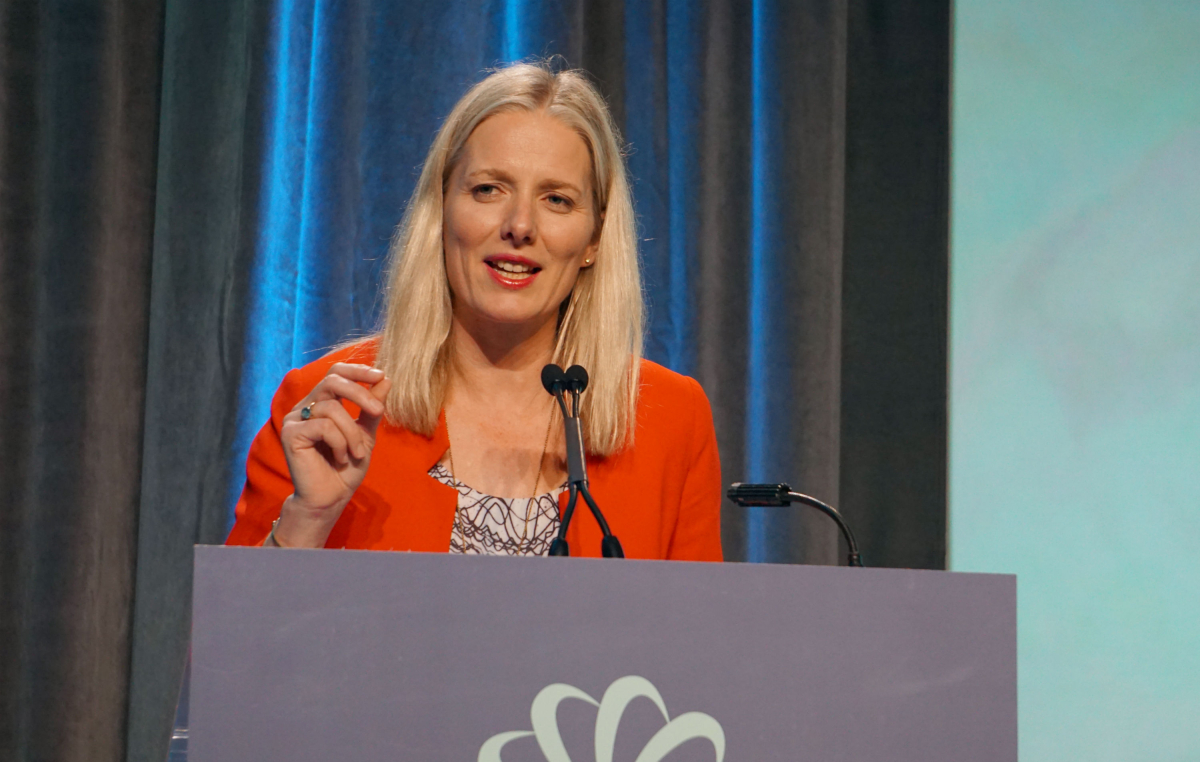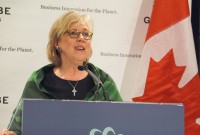Support strong Canadian climate journalism for 2025
GLOBE 2016 was a mash up of 2,000 leaders from 50 countries all seeking solutions to our global sustainability challenges. Three days and numerous panel presentations generated data, resources, and ideas that will inform my program planning at SFU’s Faculty of Environment. Highlights included the opening speech of Canada’s Prime Minister who made it exceedingly clear that we are on the pathway to a low carbon future and Canada has a leadership role to play.
“Climate change is serious,” said Canada’s Minister of Environment and Climate Change, Catherine McKenna. “We are now bringing Paris home…we don’t have a choice.”
The Global Carbon Budget was referenced in many sessions — and then ignored in others. The Carbon Budget is what the International Panel of Climate Change (IPCC) says is the amount of carbon we can emit globally into the atmosphere before we warm the planet by 2 more degrees Celsius. The total budget is 800 billion tons of which we have already spent almost two thirds. We have about 270 billion tons of carbon dioxide left to spend. We might have even less since permafrost melts are releasing methane and other green house gases (GHGs) at alarming rates. Land sinks such as forests and soils as well as oceans provide a natural carbon sequestration service but we know that deforestation and ocean acidification challenge their capacity to do so.
These are the sobering facts to be kept front of mind when talking about GHG emissions reduction and what variety of energy policies to pursue here in Canada and globally. Mark Carney, our former head of the Bank of Canada, now head of the Back of England recently stated that “the surfeit of existing schemes and fragmented disclosures means a risk of getting “lost in the right direction.”
That was the case when Harvard economist, Michael Porter, made a compelling argument for developing Liquefied Natural Gas (LNG) as a “clean” transitional energy source while we move to 100 per cent renewables. But when asked about the carbon budget of this strategy, Porter was at a loss. Others had done the math, and the numbers didn’t tally.
The carbon budget needs to be our guiding star in all decisions regarding emissions reductions, investments in renewable energy, but it’s not. We learned from the Paris COP21 United Nations climate conference in December of 2015 that 195 countries agree about the limits of our carbon budget. They just haven’t determined what countries get what portion or how to work within it. In the developed world we are spending more than our fair share while others, living much more lightly than us across the world, are suffering from climate induced hazards like floods and droughts and loss of biodiversity.
The IPCC says that If we carry on with a ‘business as usual’ carbon emissions scenario, we will have — at best — 25 years before catastrophic climate events will rock our world, if they haven’t already before that time. Human induced climate changes are happening now with increased frequency and force in Canada (e.g., forest fires, droughts, melting icecaps and permafrost, and remember the pine beetle epidemic?) But it is poorest people who are the most vulnerable and feel the greatest impact, particularly women and children. How can we let this happen?
While Globe 2016 was underway, a First Ministers’ Conference was convened by the Prime Minister of Canada. At the end of the week we heard that the Vancouver Declaration on Clean Growth and Climate Change has yet to come up with a Canadian framework for action by the provinces, specific carbon reduction targets or a strategy for how to reach them. Putting a price on carbon is meant to induce emitters to look for alternative energies, preferably wind and solar.
We urgently need a plan that will allow all sectors, including regular citizens’, to support aggressive, transformational renewable energy public policy. We easily understand household budgets – overspend and the consequences are felt immediately and at a price of 18 percent interest or worse. Overspend on carbon dioxide emissions and our carelessness will come back to bite us soon enough through water shortages, more frequent forest fires, high food prices and climate refugees. There will be many deaths and much suffering.
Geographer Chris Turner said in a recent Walrus essay that “it’s time to fling the false choice between economic and environmental health into the dustbin of history.”
It is also time to recognize that we are all citizens of one global society who breath from the same biosphere. Our fates are interconnected. Adaptive leaders from business, governments and citizen groups recognize that the carbon budget is finite. Getting us all to understand and work within it will be the defining project of our time. It requires fearless, non-partisan, collective action moving swiftly in the same direction and we all need to work together to make this transition possible.




Comments